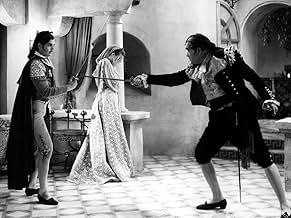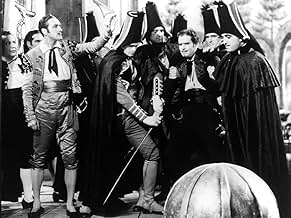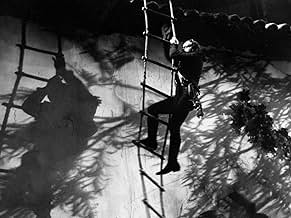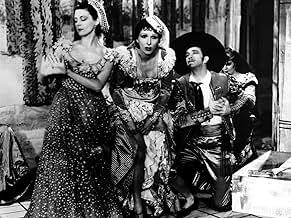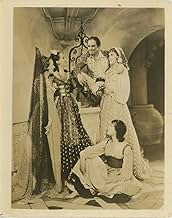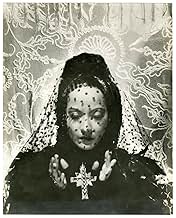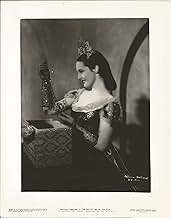Don Juan está envejeciendo. Llegó de forma clandestina a Sevilla tras veinte años de ausencia. Su esposa Dolores con la que no ha vivido en cinco años, desea vengarse de él por haberla aband... Leer todoDon Juan está envejeciendo. Llegó de forma clandestina a Sevilla tras veinte años de ausencia. Su esposa Dolores con la que no ha vivido en cinco años, desea vengarse de él por haberla abandonado tanto tiempo.Don Juan está envejeciendo. Llegó de forma clandestina a Sevilla tras veinte años de ausencia. Su esposa Dolores con la que no ha vivido en cinco años, desea vengarse de él por haberla abandonado tanto tiempo.
- Dirección
- Guionistas
- Elenco
- Premios
- 1 premio ganado y 1 nominación en total
Barry MacKay
- Rodrigo The Impostor - A Man of Romance
- (as Barry Mackay)
Claud Allister
- The Duke - A Dukes Go
- (as Claude Allister)
Opiniones destacadas
Legendary lover Douglas Fairbanks (as Don Juan) feels the fatigue of advancing years; so, the ageing lady-killer takes advantage of a misunderstanding, and fakes his own death. After a rest, Mr. Fairbanks tries to return to his amorous ways; but, nobody believes he's the real Don Juan. Through it all, Fairbanks fans both new (Merle Oberon as Antonita) and old (Benita Hume as Dona Dolores) flames.
A look at the credits of "The Private Life of Henry VIII" (1933) will reveal what filmmaker Alexander Korda had in mind - obviously, with "Don Juan", he hoped to duplicate the success of the earlier "Henry VIII". Unfortunately, this similarly staged "Private Life" found itself coming up short, and is significantly more lowly regarded. Indeed, it is a flat film. Moreover, the supporting cast is introduced in a confusing manner; it's difficult to keep track of who's who.
In his last film role, Fairbanks is terrific as an ageing "Don Juan". Interestingly, he succeeds in eliciting the feeling he memorably portrayed "Don Juan" sometime during his 1920s box office reign. Not so, the famed womanizer was played, in fact, by John Barrymore; and, in spirit, by Rudolph Valentino. Still, Fairbanks makes the role personal; undoubtedly, his status as an fading film superstar helped.
Fairbanks' best scene occurs about a half hour in, when he is informed of his character's "death" via the sword of Gibson Gowland (as Don Alfredo). Fairbanks pretends to be his character's mourning steward; then, he offers some interesting, likely personal, observations on fame. This is followed by a nice funeral sequence, revealing much about the famed lady-killer's escapades. Barry Mackay's deftly inept portrayal as a wannabe Juan is worth noting; his "inability" to leap effectively contracts Fairbanks' ageing gracefulness.
******* The Private Life of Don Juan (8/28/34) Alexander Korda ~ Douglas Fairbanks, Merle Oberon, Benita Hume
A look at the credits of "The Private Life of Henry VIII" (1933) will reveal what filmmaker Alexander Korda had in mind - obviously, with "Don Juan", he hoped to duplicate the success of the earlier "Henry VIII". Unfortunately, this similarly staged "Private Life" found itself coming up short, and is significantly more lowly regarded. Indeed, it is a flat film. Moreover, the supporting cast is introduced in a confusing manner; it's difficult to keep track of who's who.
In his last film role, Fairbanks is terrific as an ageing "Don Juan". Interestingly, he succeeds in eliciting the feeling he memorably portrayed "Don Juan" sometime during his 1920s box office reign. Not so, the famed womanizer was played, in fact, by John Barrymore; and, in spirit, by Rudolph Valentino. Still, Fairbanks makes the role personal; undoubtedly, his status as an fading film superstar helped.
Fairbanks' best scene occurs about a half hour in, when he is informed of his character's "death" via the sword of Gibson Gowland (as Don Alfredo). Fairbanks pretends to be his character's mourning steward; then, he offers some interesting, likely personal, observations on fame. This is followed by a nice funeral sequence, revealing much about the famed lady-killer's escapades. Barry Mackay's deftly inept portrayal as a wannabe Juan is worth noting; his "inability" to leap effectively contracts Fairbanks' ageing gracefulness.
******* The Private Life of Don Juan (8/28/34) Alexander Korda ~ Douglas Fairbanks, Merle Oberon, Benita Hume
In one scene Melville Cooper says to Douglas Fairbanks: "Leave off while they still think of you as you were ten years ago". It is a sad moment that you feel must have rung true for the two actors. The great Fairbanks, a movie legend, hadn't worked for two years. His famous marriage to Mary Pickford was at an end. And he was ageing, at 51 he could no longer fill the film with his trademark stunts - though he still climbs a mean rope ladder.
Korda, perhaps cruelly, makes Don Juan a rather pathetic character - living off his legend rather than any real charm or beauty. Once he allows the public to believe he is dead, the real Don Juan can't even seduce a kitchen maid, and the only offer he receives is from an old lady - in a scene beautifully played by Fairbanks. When he stands on a stage and declares that he is Don Juan he is met with gales of laughter. You can't help thinking that Fairbanks might have met the same reaction had he stood before a crowd and declared himself to be Douglas Fairbanks.
The film itself is actually pretty good - splendidly staged if a little clumsy in pace. And Merle Oberon is ravishingly beautiful. Fairbanks, like Don Juan, seems tired - ready for retirement. The spark re-ignites briefly in some scenes, but the overall feeling is one of defeat. Within five years Fairbanks would be dead having never worked again. As the film concludes, with Don Juan finally succumbing to marriage, and therefore retirement, we get the impression that he won't live much longer either. A god has been brought to earth. A flame extinguished.
Korda, perhaps cruelly, makes Don Juan a rather pathetic character - living off his legend rather than any real charm or beauty. Once he allows the public to believe he is dead, the real Don Juan can't even seduce a kitchen maid, and the only offer he receives is from an old lady - in a scene beautifully played by Fairbanks. When he stands on a stage and declares that he is Don Juan he is met with gales of laughter. You can't help thinking that Fairbanks might have met the same reaction had he stood before a crowd and declared himself to be Douglas Fairbanks.
The film itself is actually pretty good - splendidly staged if a little clumsy in pace. And Merle Oberon is ravishingly beautiful. Fairbanks, like Don Juan, seems tired - ready for retirement. The spark re-ignites briefly in some scenes, but the overall feeling is one of defeat. Within five years Fairbanks would be dead having never worked again. As the film concludes, with Don Juan finally succumbing to marriage, and therefore retirement, we get the impression that he won't live much longer either. A god has been brought to earth. A flame extinguished.
In 1934, at age 51, Douglas Fairbanks had already decided to end his magnificent and very prolific acting career. Not because he couldn't cope with sound (he had a very nice, strong voice), or with the kind of movies that were popular at the time - he'd originally started as a comedian before he went into the romantic swashbucklers that made him so hugely famous; and in the 30s, screwball comedies were at their height, so he could still have remained a top star for years if he'd wanted to.
But he wanted to retire WHILE he was still on top - and while he could still perform some of those marvelous acrobatic tricks that he'd always employed in his swashbucklers as well as in his comedies and that he himself loved so much doing; and so, for his last role, he chose the one famous character that he hadn't impersonated yet among all the classic heroes of romantic fiction, and that suited him so very well: Don Juan - but an aging Don Juan. A Don Juan who had become tired of keeping in shape for balcony climbing and love-making to young ladies, something which required daily training and diet - a kind of self-confession that he conveyed through his role...
So he shows us here for the last time a display of his famous sword fighting, balcony climbing, and of course romancing - but at the same time, he parodies not only the self-satisfied Don Juan with the myth that surrounds him, but also himself; he wasn't above that.
He was in NO way obliged to admit to his doctor, who calls him "King of Hearts": - "Well, nowadays, when I sit down to a... quiet game with a lady, I'm - no longer sure of holding the card..." Neither to play that scene with the middle-aged innkeeper who has a go at him in a PRETTY unflattering way: "You've no money, no looks, not very much brain - and you're no chicken! You'd make a nice husband..." Neither to have all the young girls of Seville laugh at him when he, who was believed dead, finally steps in in the middle of a stage play about his own 'private life' and declares that HE is the real Don Juan...
And yet he DID play all these scenes - because he wanted to. He wanted to say 'goodbye' to acting with a good dose of self-mockery; he was MAN enough not only to admit that time hadn't just passed him by, but to ridicule that fact in such an exaggerated way that again makes us say automatically: "But hey, you're just joking - you ARE the King of Hearts, and you always will be!" So, with this hilariously funny, bright, romantic costume piece full of action and laughter, Doug Fairbanks retired from the acting stage - not in a pathetic, dramatic way, but in a humorous, lovable one that's kept him in the hearts of his fans until this day. So that's the special meaning behind this very enjoyable period comedy-parody that certainly never gets dull or sentimental or boring for one single moment...
But he wanted to retire WHILE he was still on top - and while he could still perform some of those marvelous acrobatic tricks that he'd always employed in his swashbucklers as well as in his comedies and that he himself loved so much doing; and so, for his last role, he chose the one famous character that he hadn't impersonated yet among all the classic heroes of romantic fiction, and that suited him so very well: Don Juan - but an aging Don Juan. A Don Juan who had become tired of keeping in shape for balcony climbing and love-making to young ladies, something which required daily training and diet - a kind of self-confession that he conveyed through his role...
So he shows us here for the last time a display of his famous sword fighting, balcony climbing, and of course romancing - but at the same time, he parodies not only the self-satisfied Don Juan with the myth that surrounds him, but also himself; he wasn't above that.
He was in NO way obliged to admit to his doctor, who calls him "King of Hearts": - "Well, nowadays, when I sit down to a... quiet game with a lady, I'm - no longer sure of holding the card..." Neither to play that scene with the middle-aged innkeeper who has a go at him in a PRETTY unflattering way: "You've no money, no looks, not very much brain - and you're no chicken! You'd make a nice husband..." Neither to have all the young girls of Seville laugh at him when he, who was believed dead, finally steps in in the middle of a stage play about his own 'private life' and declares that HE is the real Don Juan...
And yet he DID play all these scenes - because he wanted to. He wanted to say 'goodbye' to acting with a good dose of self-mockery; he was MAN enough not only to admit that time hadn't just passed him by, but to ridicule that fact in such an exaggerated way that again makes us say automatically: "But hey, you're just joking - you ARE the King of Hearts, and you always will be!" So, with this hilariously funny, bright, romantic costume piece full of action and laughter, Doug Fairbanks retired from the acting stage - not in a pathetic, dramatic way, but in a humorous, lovable one that's kept him in the hearts of his fans until this day. So that's the special meaning behind this very enjoyable period comedy-parody that certainly never gets dull or sentimental or boring for one single moment...
This was at the twilight of Douglas Fairbanks's career and he gives a great performance both in comedy and adventure as Don Juan. He wasn't at the end of his career because he was too old or no longer popular in fact he just decided to call it a day while he was still very much a huge star and relatively young at barely over 50 years old. It's a great performance and a great way to say goodbye for Douglas Fairbanks. The movie is not the best but he is superb.
In Douglas Fairbanks, Jr.'s memoirs, he and his father decided in 1933 to go over to Great Britain together for work. Fairbanks the younger wasn't satisfied with his film career at Warner Brothers and his father was falling head over heels with the British Lady Sylvia Ashley. She became his third and last wife. Doug Jr. said that they bonded while there closer than they did while he was a child.
Doug Jr. did a bunch of films and some stage work in London, his best known film in his British period was Catherine the Great with Elizabeth Bergner. Doug, Sr. did this one film, The Private Life of Don Juan and it's as tailor made a farewell to the screen as The Shootist was for John Wayne.
We all of us get older and even such sex symbols as Don Juan does. He's wearying of the life and I suspect has not the stamina any more for what he was known for. When rumor goes around he's been killed finally by an irate husband, Fairbanks decides with his faithful man Friday, Leporello, played by Melville Cooper to take a long needed rest.
The problem comes when he decides to make a comeback and no one believes this 51 year old man is the real Don Juan. Fairbanks was 51 when he made The Private Life of Don Juan and he did look pretty good for a 51 year old man. At least I didn't look as good when I hit that age.
What will the outcome be for the aged Lothario? For that you'll have to see the film and I will say that Alexander Korda provided a nice bevy of British beauties for Fairbanks to choose from. Such beautiful and talented folks as Merle Oberon, Benita Hume, Binnie Barnes, and Diana Napier all vie for Fairbanks's attention at one point in the film.
Best in the film however is Athene Seyler and her proposition to Fairbanks. Her scene with him is a delight.
I don't know if Fairbanks had it in his head that The Private Life of Don Juan would be his farewell picture. It needn't have been, his speaking voice registered well for sound and by 1934 he wasn't overacting as many of his silent contemporaries did and ruined their careers thereby. But The Private Life of Don Juan was perfect as a farewell performance for a man who was an American icon in his day, as much as John Wayne was in his.
Doug Jr. did a bunch of films and some stage work in London, his best known film in his British period was Catherine the Great with Elizabeth Bergner. Doug, Sr. did this one film, The Private Life of Don Juan and it's as tailor made a farewell to the screen as The Shootist was for John Wayne.
We all of us get older and even such sex symbols as Don Juan does. He's wearying of the life and I suspect has not the stamina any more for what he was known for. When rumor goes around he's been killed finally by an irate husband, Fairbanks decides with his faithful man Friday, Leporello, played by Melville Cooper to take a long needed rest.
The problem comes when he decides to make a comeback and no one believes this 51 year old man is the real Don Juan. Fairbanks was 51 when he made The Private Life of Don Juan and he did look pretty good for a 51 year old man. At least I didn't look as good when I hit that age.
What will the outcome be for the aged Lothario? For that you'll have to see the film and I will say that Alexander Korda provided a nice bevy of British beauties for Fairbanks to choose from. Such beautiful and talented folks as Merle Oberon, Benita Hume, Binnie Barnes, and Diana Napier all vie for Fairbanks's attention at one point in the film.
Best in the film however is Athene Seyler and her proposition to Fairbanks. Her scene with him is a delight.
I don't know if Fairbanks had it in his head that The Private Life of Don Juan would be his farewell picture. It needn't have been, his speaking voice registered well for sound and by 1934 he wasn't overacting as many of his silent contemporaries did and ruined their careers thereby. But The Private Life of Don Juan was perfect as a farewell performance for a man who was an American icon in his day, as much as John Wayne was in his.
¿Sabías que…?
- TriviaDon Juan was a real person named Miguel de Manara. In this movie, Douglas Fairbanks writes a note and signs it with that name.
- Créditos curiososLengthy, humorous and accurate role descriptions are listed for each character in the opening credits.
- ConexionesFeatured in Flores rotas (2005)
- Bandas sonorasThe Don Juan Serenade
(1934)
(Published in Great Britain with title "Senorita Carmencita")
Music by Mischa Spoliansky
Lyrics Arthur Wimperis
Performed by John Brownlee
Played as background music often
Selecciones populares
Inicia sesión para calificar y agrega a la lista de videos para obtener recomendaciones personalizadas
- How long is The Private Life of Don Juan?Con tecnología de Alexa
Detalles
- Fecha de lanzamiento
- País de origen
- Sitio oficial
- Idioma
- También se conoce como
- Privatni zivot Don Žuana
- Locaciones de filmación
- Productora
- Ver más créditos de la compañía en IMDbPro
- Tiempo de ejecución1 hora 29 minutos
- Color
- Relación de aspecto
- 1.37 : 1
Contribuir a esta página
Sugiere una edición o agrega el contenido que falta

